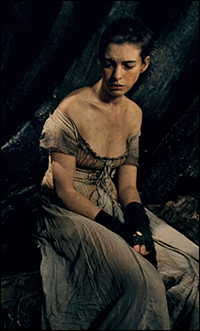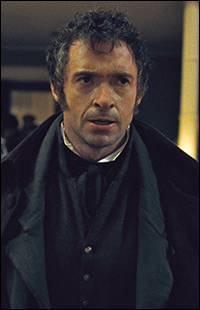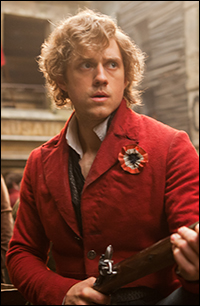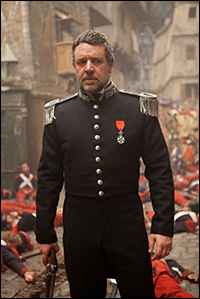
*
It took 27 years for the 1985 stage hit Les Misérables to get a big-screen version — not that the cinema is the ultimate goal of plays and musicals. But Les Miz fans couldn't help wonder over the years: "Wouldn't this decades-spanning epic about social conflict and romance look great in a sprawling, cast-of-thousands, wide-screen movie?"
It finally arrived from Universal and Working Title Films on Dec. 25, with the release of Oscar-winning director Tom Hooper's cinematic version (and vision) of the musical by writers Alain Boublil (book and lyrics), Claude-Michel Schönberg (book and music) and Herbert Kretzmer (English lyrics). William Nicholson ("Shadowlands," "Gladiator") penned the screenplay with the above trio of writers. As you probably know by now, the movie stars Tony Award winner Hugh Jackman (The Boys From Oz) as Jean Valjean, Anne Hathaway as Fantine, Russell Crowe as Javert, Tony winner Eddie Redmayne (Red) as Marius and more (all of them singing their songs live as the cameras rolled rather than lip-synching to pre-recorded music, which has been the industry norm for 70 years).
Original stage producer Cameron Mackintosh, who put all the pieces together for the stage smash, first seen in London in 1985 before it stormed Broadway in 1987, where it won the Best Musical Tony Award, is among the film's producers — along with Working Title's Eric Fellner, Tim Bevan and Debra Hayward.
Playbill snagged Mackintosh for a chat in the weeks leading up to the film's release.
 |
||
| Anne Hathaway |
||
| Universal Pictures |
Cameron Mackintosh: That's Tom's style, you know. His vision of this has absolutely been brilliant. It has been a remarkable mixture of brilliant talents from the cinema that Tom and Eric (Fellner) and Debra (Hayward) have assembled on one side, and Claude-Michel and Alain and myself and our music team from the musical theatre; we wanted to collude to create something new. The way we've done it is so unlike any movie [that has] been done. We discovered, once we got to the edit, that however brilliant the acting and the visual of it, its power is only released through the extraordinary drive of Claude-Michel's score, which will swoop you along — as [it does] in the theatre, as it does in the concert hall. It's amazing how this piece of material, if you do it right and you try to reshape it for the medium you're in, will just work.
Did you know early on, in your conversations with Tom Hooper, that the film would stress close-ups and intimacy?
CM: Well, I'm not surprised. Have you seen any of the concert versions?
Sure, on DVD.
CM: Well, if you look, both at the Albert Hall and at the O2 [films], you'll find that two-thirds is close-up. The original concert we did, in 1988 in Sydney, at the Sydney Festival, we had over 125,000 people. The camera crew…[captured actors'] faces so that the show worked in concert for this unknown audience who never knew a note of it. That was the first inkling that I had that somehow we'd stumbled on something, which was like the combination of a great concert and a great silent movie — it had all come together.
[Those filmed concerts are] why it's always been in the back of my head that if we ever got to do this [as motion picture], it has to be [sung] live. The power of Les Misérables is the fact that it is a story that happens to be sung.
 |
||
| Hugh Jackman |
||
| Universal Pictures |
CM: Tom was passionate about it, but I decided years ago that if we ever got the opportunity, that's how I want it done. Partly, I remember, seeing Alan Parker's "The Commitments" — [Alan Parker] was going to direct this [Les Miz] film 25 years ago when we had it on Broadway. And, I remember saying to Alan, "Oh, God, it has such excitement!," and he told me, "We actually recorded that live on the bus in various bits." And then with [the Alan Parker film] "Evita," [which starred] Jonathan Pryce, who had done The Engineer [in Miss Saigon] for me, I went, "You're fantastic at this," and I loved that particular scene that he confronted the generals. He sort of leapt out of the screen. He said the reason is, a lot of his stuff he did live [during filming]. So, look, me, personally, I didn't know who Tom Hooper was when he went to see [the show] — without any of us knowing it was his idea [to consider it as a film]. He picked it up from Bill Nicholson that it was going to be done [on screen], and he thought he'd go and see it — something went off in his head — and then he rang Eric Fellner at Working Title. He said, "Look, I'd be really interested to do this." At that point, he'd only made one film because "The King's Speech" hadn't been released, and Eric said to me, "Would I meet up with him?" And, I said, "I'd love to." I could tell that he was really smart, and I loved the way he talked about the film and what he would do, embracing it. Then, of course, he said, "I would really love to record it live," which was music to my ears. He was passionate to do it live.
The naturalistic, conversational quality of the singing in the film seems to have its roots in the recent 25th-anniversary production that you created in the U.K., which is now on tour in the U.S. It's less "pop-opera" and much earthier. It's not casual singing, but you know, it's more conversational singing than in the original production from the '80s. Did the rebooted revival inform this film?
CM: Yes. I know Tom went to see this in Chicago when it was there. I think it was the first time that Tom was exposed to the complete new orchestration that we've done, which is actually the basis of the film. The team of orchestrators that did that, which we then amplified for the O2 version, it's the same lot. Plus, [orchestrator and music producer] Anne Dudley joined our team from the film world — a very terrific musician. So, Tom went, "This is the way to go."
And, of course, visually, because the new version is based on the paintings of Victor Hugo himself, the film has an affinity to that look. There's a number of things which Tom has brilliantly found a cinematic way of doing; there were so many wonderful surprises and revelations to us as we watched a film being made.
 |
||
| Aaron Tveit |
||
| Universal Pictures |
CM: Yes. But the point is, Tom was full of admiration for the stagecraft of the show. What he wanted to do, as we wanted to do, was not film the stage show, but take the material of the stage show and remake it. To be honest, in the same way as Alain and Claude-Michel and I had to remake what, although I didn't see it, the original French version [was], which was half the material but we treated it like a new score. This is, as Alain said, "We're just going to work again 30 years later. Aren't we lucky?" Of course, there are many iconic things that Tom wanted to find his own version of, and some of the stuff — some of the iconic stuff — you can only do in the theatre. I also love the magic, filmic, visual touches in the garden between Cosette and Marius — with the wisteria and the butterfly. Tiny, sensual details.
CM: Tom's eye is extraordinary—relentless, extraordinary and a supreme inventive.
 |
||
| Russell Crowe |
||
| Universal Pictures |
CM: I think it was Russell's idea to do what I call the Douglas Fairbanks/Errol Flynn confrontation [a kind of swordfight between Valjean and Javert in Fantine's sickroom], but that's brilliant. I went, "What a fabulous idea!" It's absolutely fabulous! And isn't it wonderful that a huge majority of that cast has all been born in the musical theatre?
I didn't know that Eddie Redmayne could sing.
CM: Well, you know who knew that? Claude-Michel knew him. It was his idea, and he rang me. Eddie reminded me [that] he started off in [my] Oliver! at the Palladium as a kid! [Laughs.] So many of them have this connection [to being fans of Les Miz], and this cast wanted to do Les Misérables. That's what makes Les Misérables special. Every cast wants to embrace it as theirs, you know.
(Kenneth Jones is managing editor of Playbill.com. Follow him on Twitter @PlaybillKenneth.)










